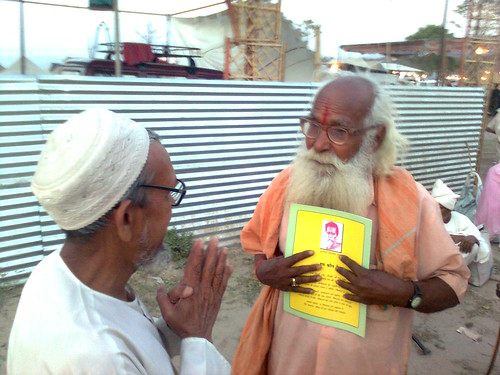(Translated from Urdu by Yoginder Sikand)
The first step in the quest for inter-community dialogue is the search for common ground. Religious and cultural differences divide Hindus and Muslims from each other. This diversity need not necessarily be seen as intimidating, however. In fact, the Quran explains that diversity is natural. The Quran instructs us thus: ‘If God so willed, He could make you all one people’ (16:93).
Commenting on the above-quoted Quranic verse, the noted Islamic scholar Imam Razi writes in his Tafsir-e Kabir that this refers to the fact of diversity of religions and customs among human beings.
Nature desires diversity, not uniformity. That is why we should aim not at eliminating these differences but, rather, to tolerate them in accordance with the demands of Nature.
Man is a social animal. It is ingrained in his nature to seek to live in peace with others. That is why there are no two communities in the entire world that have nothing in common between them. It was for the common purpose of protection, peace and justice that the Prophet entered into a treaty or pact with the Jews of Medina. This is an instance of practical inter-community dialogue based on common values and concerns.
The basic task before is to seek to develop and promote that spirit among both Hindus and Muslims that would urge them to ignore their differences and, instead, focus on what they have in common or on issues of common concern that can bring them closer to each other. We must not let what sets us apart overwhelm what we have in common. A key aspect that we Indian Hindus and Muslims have in common is our Indianness, the fact of belonging to the same land. Another key issue and concern that can bring us together is a common quest for preventing moral decline in our societies, which both Hindus and Muslims are faced with. Anti-religious forms of secularism and liberalism invented in the West that claim to have ‘liberated’ human beings from God have led to horrendous anarchy throughout the world, including in our own country. This calls for Hindus, Muslims and people of other faiths, who take their religions seriously, to work together to combat such dangerous tendencies. This is a duty we all owe to God and to humanity, which we must undertake in cooperation with each other.
Hindu-Muslim dialogue involves efforts at both the intellectual as well as practical levels. But, all these efforts can make no headway without sincerity of purpose. If these efforts are made simply for political gain or fame they can produce no positive results. Parties to the dialogue must be conscious of the fact that they need each other. They must realize that they can and, indeed, must, learn from each other. They must know that the progress of our common homeland, and, therefore, of each and every community that inhabits it, is impossible without Hindu-Muslim cooperation. For meaningful dialogue between Muslims and Hindus, both must consider themselves not as opponents but as friends, or at least as potential friends.
Hindu-Muslim dialogue, or inter-community dialogue more generally, must focus, among other issues, on addressing and removing mutual misunderstandings, which are often rooted in deeply-held but misleading negative stereotypical images of the ‘other’. Some of these misunderstandings are rooted in our traditional ways of thinking about the ‘other’. One such contentious issue is the way Muslims understand the status of the Hindus and their religion in terms of the shariah. While many ulemasee nothing of worth in the Hindu religion and consider all the Hindus to be polytheists, some of them are of the view that the basic principles of monotheism and prophethood can be discerned in the religious traditions of the Hindus. The founder of the Dar ul-Uloom at Deoband, Maulana Qasim Nanotavi, was of the opinion that Ram and Krishna might possibly have been prophets of God and that is why Muslims must not say anything bad about them. Some scholars, including a leading Sanskrit scholar Pandit Ved Prakash Upadhyaya, claim that the Kalki Avatar or Antim Rishi mentioned in some Hindu scriptures actually refers to the Prophet Muhammad. If this is true, then obviously these scriptures cannot be said not to have been of divine origin.
Another issue that continues to be discussed in ulemacircles is the status of Hindus in terms of the shariah. This question needs to be resolved in the interest of Hindu-Muslim dialogue. If, as the ulema claim, the Hindus, or many of them, are polytheists (mushriks), are they to be considered mushriks in the same sense as Muslims understood the pagan Arabs at the time of the Prophet? I personally believe that a distinction should be made between the two. Even the classical jurists and Quranic commentators differentiated between the Arab pagans, who virulently opposed the Prophet, and other pagan so that the commandment for jihad vis-à-vis the former did not apply in the same way to the latter. It is critical to distinguish the Hindus from the Arab pagans because of the tendency of many ulema to relate and apply Quranic verses about the pagan Arabs to the Hindus of today, as, for instance, the verse which says, ‘Strongest among men in enmity to the believers will you find the Jews and pagans’ (5:82). Clearly, this is unacceptable.

Read more : The common bases for Hindu-Muslim dialogue | TwoCircles.net
No comments:
Post a Comment